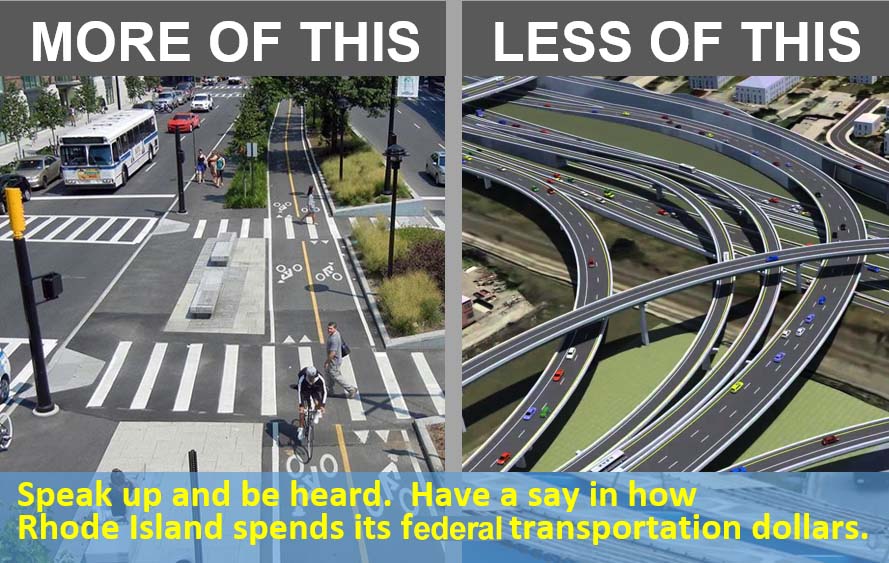Dear Community,
Last summer, we organized around the RI Department of Transportation’s 10-year funding plan: an opaque process which continues to prioritize highway expansion while underfunding public transit and active mobility projects that support people and the planet.
Now, the federal Transportation Bill is giving Rhode Island an additional $750 million, which RIDOT proposes to fast track via “Minor Amendment 2” – with minimal public input and token consideration of the mandates of the RI 2021 Act on Climate law.
WHAT YOU CAN DO:
- Read PSC member Green Energy Consumers Alliance’s memo on Minor Amendment 2 for more context
- Call House Speaker Shekarchi’s office at 401-222-2466 and ask him to: 1) support our climate requirements being met through all of DOT’s actions and 2) that the General Assembly provide greater oversight and opportunity for public input in the spending of these public funds.
- Submit a comment on Minor Amendment 2 at this link before 4pm on Monday, February 14th. Some suggested language you can use:
- My primary concern relates to the limited opportunity for public engagement considering this once-in-a-generation federal funding. Such a significant investment requires greater public engagement than written comment at an administrative meeting. Such important and extensive changes to the STIP warrant a robust public process to identify and select projects. Additionally, the Department of Transportation should be consulting with other state leaders to ensure all future transportation investments are in line with other state commitments, such as the Act on Climate law and the Long Range Transportation Plan.
- The transportation sector is currently the largest and fastest-growing contributor to emissions in the state, and though the state is working on updating its climate action plan; it’s clear that reducing emissions on the scale needed will require a massive shift from polluting, auto-dependent infrastructure to cleaner, healthier mobility options.
- The STIP contains all transportation infrastructure projects through 2031, and Rhode Island has its first emissions reduction deadline in 2030. Therefore, the investments outlined in the STIP and the changes in proposed Amendment #2 will shape how Rhode Island’s largest emitting sector responds to the climate mandate. Some projects, such as adding vehicle lanes to highways, will make it harder to meet the 2030 Act On Climate goal by prioritizing driving and increasing gasoline consumption. Others, such as investments in transit, active mobility, and electric vehicle (EV) charging infrastructure, are known to decrease emissions.
- Justice40, a “whole-of-government” commitment established by federal Executive Order, encourages 40% of benefits of all federal investments in climate and clean energy go to disadvantaged communities. It’s not clear how the Justice40 commitment was considered within Amendment #2. A more robust public participation process for the allocation of IIJA funds can ensure better alignment with Justice40.
- Sincerely engaging the people of Rhode Island as well as climate, environment, transit, and active mobility stakeholders is necessary to capitalize on the historic funding opportunity provided by the IIJA. There should also be greater coordination with the EC4 in developing carbon mitigation strategies for transportation to make sure the STIP is aligned with the state’s goals. Proposed Amendment #2 should be denied.
- Plan to attend the TAC meeting on Thursday, February 17, 2022 at 5:30 pm. The public can participate virtually at https://us02web.zoom.us/j/85336842260?pwd=UVRpSnBRWVJVNWQ0VEk1MVBhZGUrUT09 Password: 570944. While there will be no oral public comment specifically on Minor Amendment 2, there will be general public comment at the beginning and end of the meeting, as well as an opportunity to speak with federal representatives on Rhode Island’s transportation planning process.

